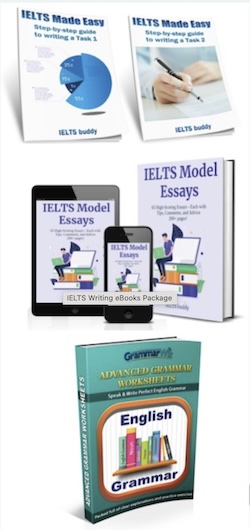- Home
- IELTS Videos
IELTS Videos
Here we have a number of IELTS videos to help you prepare for and understand the exam.
We'll keep adding videos so keep an eye on the page or better still subscribe to the IELTS buddy You Tube channel and you'll be notified whenever a new video is added.
IELTS Writing Task 1 (Academic)
Task 1 Explained
This video tells you the basics of what to expect in the IELTS Writing Academic Task 1 part of the test.
Find out what kind of graphs or diagrams you may get and the language you'll need to be successful.

Overview of How to Write an IELTS Academic Task 1
This video explains how to write an IELTS academic task 1 by showing you the three key elements that make up any task 1 about lines graphs, bar charts, pie charts and tables.

Do I need a conclusion for Task 1?
This often leaves candidates practicing for the test confused! Find out for sure what you need to do here.

Writing about an IELTS Process Diagram
Sometimes in IELTS writing academic task 1 you will be given a process to write about.
This lesson explains the key things you need to know in order to write about a process and get a high score.

Writing about an IELTS Table
Another possibility for a task 1 in academic is a table. This lesson explains the key elements needed to write a high-scoring response to a table.

Writing about Two Graphs Together
Sometimes in IELTS academic task 1 you have to describe two graphs or charts together rather than just getting one. It can look daunting but it's easier than you think. However, making some simple errors can cost you dearly.
This lesson shows you have to write about 2 graphs in a simple

Describing Graphs & Charts Over Time
For a high score, it's critical to understand how to use the language of change but also to combine this with the language of comparison and contrast.
This video explains how to write graphs over time, focusing on the language to use and organisation.

Avoid this Common Mistake in Your IELTS Graph
This lesson is about a common mistake that candidates in the IELTS test make when writing about IELTS graphs and how to avoid. Making this mistake could affect your task achievement score!

IELTS Writing Task 1 (General)
IELTS Band 9 Letter
By using the example of a band 9 letter, this IELTS video shows you exactly what you need to do to get a high score in your task 1 for general training.

The Structure of IELTS Letters
Letters all follow the same basic structure, so save your time and check out this video lesson which explains step-by-step the way to organise any IELTS letter!

Opening and Closing IELTS Letters
You need to open and close IELTS letters with the correct salutations. Getting these wrong could decrease your score for Task Achievement to a band 5 or even 4!
In this lesson we provide you with the correct openings and closings.

IELTS Writing Task 2
You have to write an essay for both academic and general training, so these IELTS videos are relevant to both.
How to Write an IELTS Essay
This IELTS video shows you how to generally structure and write an IELTS type short essay in the test. It does this by using the example of an agree / disagree type question.

Task 2 Explained
This next IELTS video provides an overview of the basics of the IELTS Writing Task 2 Essay.
Find out about the different types of essay question you could get.

Brainstorming and Planning an Essay
Brainstorming and planning is a key step to developing a well-supported essay, so you should not miss this out. This lesson explains how to brainstorm and plan.

IELTS Essay Introductions
Many students waste time writing a long essay introduction in the test, which is not clear or does not leave them enough time to finish the essay.
Find out how to write a quick and coherent IELTS essay introduction for the academic or general training Task 2.

IELTS Essay Thesis Statements
Your thesis statement in your IELTS essay is a critical part of your introduction. It must be written clearly and concisely so the examiner knows what your essay will be about and (if asked for) what your opinion is. This lesson shows you how to write an effective thesis statement quickly.

IELTS Essay Conclusions
Like for introductions, you want to have a formula/technique for writing your conclusion quickly. Check out how to do this.

IELTS Essay Band 7+ Transitional Phrases
IELTS Essay transitions are important.
This lesson tell you how you can move from an IELTS band 6 to IELTS band 7 for Coherence and Cohesion by improving your linking words, or transitions, between sentences and paragraphs.
These come under cohesive devices in the marking system.

Using Personal Pronouns in IELTS Essays
Whether to use personal pronouns (e.g. "I", "you", "we" and "they") in essays for IELTS is a question that comes up often with students studying for the test.
Find out if and how you can use them without affecting your score.

3 Types of IELTS Opinion Essay
Teaching materials often confuse students with the various types of opinion essay but they can be placed into 3 simple categories.
Learn more about what they are so you know how to answer these types of essay.

How to Write IELTS Problem Solution Essays
Candidates often write IELTS problem solutions essays that do not properly explain the problems or solutions.
This lesson explains clearly and simply how to organise these types of essay and how to make sure you get a higher score for Task Response by providing ideas that are extended and supported.

IELTS Academic Reading Videos
The reading part of the test is difficult, even for native speakers in cases.
These IELTS video lectures guide you step-by-step through a real IELTS test reading passage, looking at the answers and discussing how to make the correct choice.
Summary Completion

True / False / Not Given

Multiple Choice

IELTS Videos: Listening
Top 10 IELTS Listening Tips
In this IELTS video I've picked out for you 10 of the best IELTS listening tips.

Full IELTS Listening Test (with answers)

IELTS Videos: Speaking
Replying Correctly to IELTS Speaking Part 1 Questions
You must listen carefully and ensure you answer the exact question the examiner has asked you. This video gives you tips on the different questions types for part 1 and how to make sure you answer them correctly.

Talking about Hypothetical Situations in IELTS Speaking Part 2
You may well have to talk about hypothetical situations in IELTS speaking part 2 - this is when the word 'would' is used and you are talking about unreal or imaginary situations in the future. Learn how to answer these types of questions.

IELTS Speaking Part 3: Comparing the Past with the Present
It is common in part 3 to be asked to compare a current situation with how it was in the past. This IELTS video gives you useful language for answering such questions.

Sample IELTS Speaking Test Questions for Parts 1, 2 & 3
This IELTS video provides you with an overview of the types of questions you will get in parts 1, 2, and 3 of the speaking test.

Using Will and Going to for the Future in IELTS Speaking
You need to know how to use Will and Going to for the Future in IELTS speaking as you'll commonly be asked about the future in part 3. You may also want to talk about the future in other parts.
This lesson explains how to use Will and Going to and gives you example questions and answers.

IELTS Speaking Part 2 Sample
Listen to a response of somebody talking about a present they gave to someone.

IELTS Vocabulary
Phrasal Verbs
This lesson looks at how to use phrasal verbs in IELTS to boost your vocabulary score for speaking and writing informal letters (general training). You'll learn how to construct phrasal verbs grammatically and then see examples used in response to typical IELTS part 1 speaking questions.

Collocation
This lesson examines why collocation is critical for a high IELTS score. If you learn new words, you must learn what words they collocate with - if you don't do this, you'll likely make errors when you use those new words, affecting your lexis/vocabulary score.

IELTS Scores
Often IELTS students are confused by how the scoring works in IELTS.
How is each module graded? How is your total score worked out? And what can you do if you do not agree with the score?

Grammar
Good grammar is obviously very important for the IELTS test so they can provide you with some general grammar training if you are weak in that area.
Complex Sentences for IELTS Writing
This IELTS video explains the main types of complex sentences you can add to your writing to ensure you score well for grammatical range and accuracy.

Types of Dependent Clauses
Using a mix of accurate complex sentences is crucial if you want a band 6 or above for your grammar in your writing. To do this you must understand the differing types of dependent clause.

Reported Speech Tenses
We use reported speech to report back what someone said. This lesson explains how the tenses change when you do this.

Comments
Any comments or questions about this page or about IELTS? Post them here. Your email will not be published or shared.



















